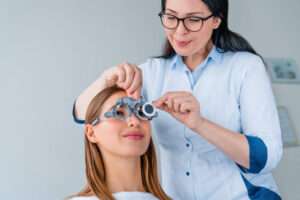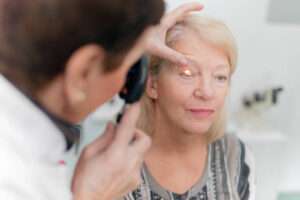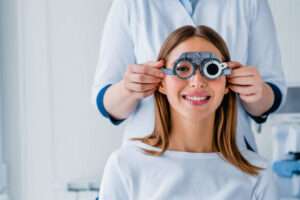Eye Exams: Why They Matter and What to Expect
Your eyes are not just the windows to your soul; they are also incredible tools that help you navigate and experience the world around you. Ensuring their well-being must be an utmost concern. One crucial step in maintaining good eye health is getting regular eye exams. In this comprehensive guide, we’ll explore the importance of eye exams, what happens during one, and why you should never skip them.

The Importance of Eye Exams
1. Detecting Vision Problems
Eye exams are not just for those with glasses or contact lenses. They are essential for everyone, as they can detect vision problems that you may not even be aware of. Conditions like nearsightedness, farsightedness, and astigmatism can develop gradually, and you might not notice the changes until they become significant. Regular eye exams can catch these issues early and provide you with the right prescription to correct your vision.

2. Early Detection of Eye Diseases
Perhaps one of the most critical aspects of eye exams is their ability to detect eye diseases at an early stage. Conditions like glaucoma, cataracts, and macular degeneration often have no noticeable symptoms in their initial phases. By the time you experience vision changes, the disease may have already progressed significantly. Regular eye exams can catch these diseases early, allowing for timely treatment to prevent further vision loss.
3. Monitoring Overall Health
Surprisingly, eye exams can also provide insights into your overall health. An eye doctor can detect signs of systemic conditions like diabetes and high blood pressure during an examination. Changes in the blood vessels in the eyes can be indicative of these health issues. Discovering them through an eye exam can prompt you to seek medical attention and start managing these conditions before they worsen.
What Happens During an Eye Exam?
Now that you understand why eye exams are vital let’s demystify what happens during one.
1. Case History
Your eye doctor will start by asking about your medical history and any existing eye conditions or vision problems. Be sure to provide detailed information to help them better understand your eye health.
2. Visual Acuity Test
The classic eye chart test measures how well you can see at various distances. You’ll be asked to read letters or symbols from a chart, one eye at a time.

https://en.wikipedia.org/wiki/Visual_acuity
3. Refraction Assessment
This test determines your eyeglass or contact lens prescription. The doctor will use a phoropter, a device with different lenses, to find the combination that gives you the clearest vision.
4. Eye Health Evaluation
Using specialized equipment, your eye doctor will examine the structures of your eye. This includes checking the health of your cornea, retina, optic nerve, and the blood vessels in your eyes.
5. Additional Tests
Depending on your age, medical history, and any specific concerns, additional tests may be conducted. These could include measuring eye pressure (tonometry), visual field testing, or color vision testing.
How Often Should You Get an Eye Exam?
The frequency of your eye exams depends on your age, risk factors, and any existing eye conditions. Here’s a general guideline:
Children: Pediatricians often perform basic eye screenings during routine checkups. If any issues are suspected, they may refer your child to an eye specialist. Otherwise, the American Optometric Association recommends the first comprehensive eye exam at six months of age, followed by exams at age 3 and before starting school.
Adults: If you have no vision problems, a comprehensive eye exam every two years is typically sufficient. However, if you wear glasses or contacts, or have underlying health conditions, your eye doctor may recommend more frequent visits.
Seniors: As you age, your risk of eye diseases increases. Therefore, adults over 60 should have annual eye exams to catch and manage age-related eye conditions promptly.
Conclusion
Regular eye exams are not something to procrastinate or ignore. They are a vital component of maintaining your overall health and well-being. By detecting vision problems and eye diseases early, you can preserve your precious eyesight and stay on top of any underlying health conditions. Remember, your eyes are irreplaceable, so make sure to prioritize their care with regular eye exams.
Don’t wait until you notice a problem with your vision; schedule your next eye exam today and enjoy the world with crystal-clear vision.
Explore the allure of eyewear fashion with our exclusive collection at Rebecca Optical. Discover frames that marry style and comfort, elevating your visual experience to a whole new level.”
Get your Appointment Now !
Secure your spot at https://rebeccaoptical.ca/book-appointment/ for a personalized eyewear consultation and experience exceptional vision at its finest. Reserve your appointment now and embark on a journey towards stylish and clear sight.
